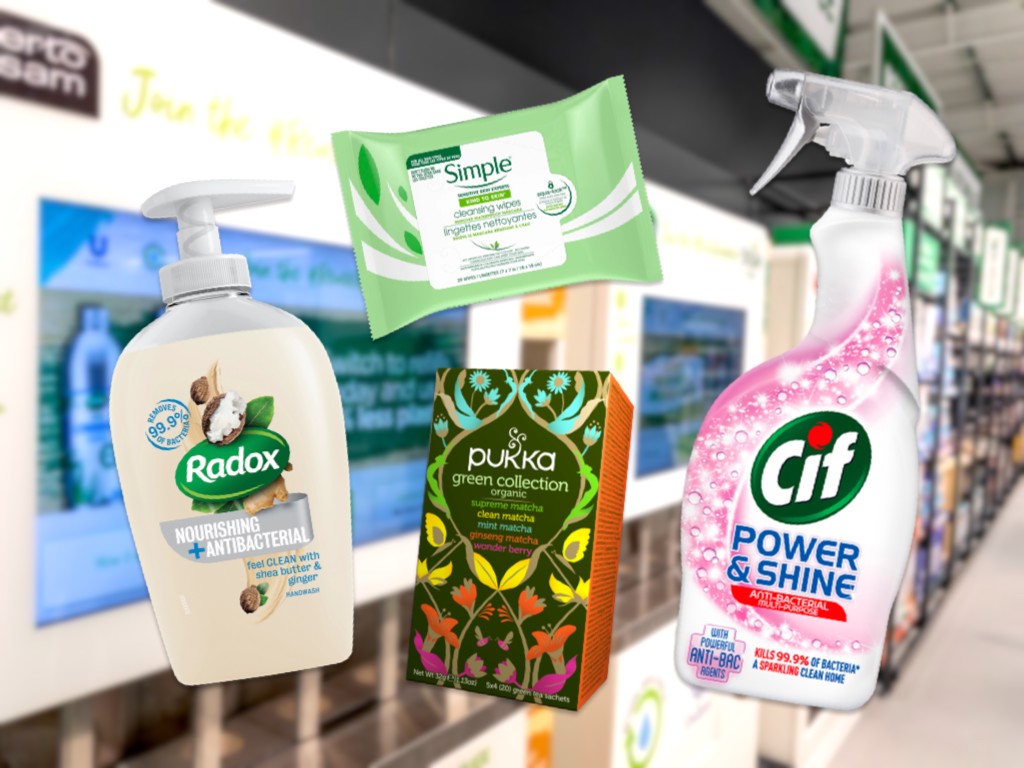Plastic-Free: Unilever Starts Major Refill Trial in Asda For Beauty, Household & Personal Care Brands
3 Mins Read
Unilever has launched its largest refill trial yet in supermarket chain Asda’s Middleton store in the British city of Leeds. The consumer goods giant says that the pilot will see seven of its brands, ranging from beauty and personal care to laundry, offer customers the option to refill and reuse products. It includes some of the most well-known household names, including Persil, Pukka and Radox.
British-Dutch multinational consumer goods giant Unilever has just launched its biggest refill trial in Europe. It will see Asda’s Middleton store in Leeds, which has been relaunched as a sustainability flagship supermarket, open a new Refill Zone where customers can purchase some of the Unilever’s brands without any single-use packaging. Among the brands participating in the test launch include laundry detergent Persil, bath soaps Radox and Alberto Balsam, kitchen cleaner Cif, beauty and personal care label Simple, and tea brands PG Tips and Pukka.
There will be three different refill formats showcased in the store. The first is a touch-free refill machine that dispenses liquids in reusable steel or aluminium bottles with fully traceable QR codes, which was developed by British sustainable beauty brand Beauty Kitchen. Once the bottle is filled, customers can add their printed label and checkout as usual.
I am very excited by the potential to test and learn from this fantastic partnership with Asda. It’s a great opportunity for us to find out, across seven of our leading brands, just how shoppers respond to using refillable and reusable packaging in-store.
Sebastian Munden, Regional Executive Vice President of Unilever
Second is an in-home refill option, which will provide shoppers with an entire bay of concentrated refills for sprays in cleaning products like Cif, while the third model involves self-serve containers where customers can self-dispense Pukka and PG loose teas or biodegradable tea bags into their own reusable boxes, which are then weighed for payment.
Commenting on the initiative, Sebastian Munden, regional executive vice president of Unilever said: “I am very excited by the potential to test and learn from this fantastic partnership with Asda. It’s a great opportunity for us to find out, across seven of our leading brands, just how shoppers respond to using refillable and reusable packaging in-store.”
It’s a part of Unilever’s company-wide commitment to halve their use of virgin plastic, and ensure that all their packaging can be reusable, recyclable or compostable within the next five years – a crucial responsibility for global companies if we are make progress on the plastic pollution crisis, which will leave behind 710 million tonnes of plastic waste even if we curb use by 80%.
But beyond the environmental impact that corporations’ move towards circularity will have, trends have made clear that businesses simply won’t retain customers if they resist change. According to the latest research by Kantar, concerns over plastic waste is rising amongst U.K. consumers, with over 60% saying they prefer using refills if it is made available to them.
It’s therefore no surprise that Unilever has been ramping up its sustainability campaigns of late, from announcing that it will eliminate all fossil fuels in its cleaning products by 2030, to launching a US$1.1 billion climate fund and pledging to show carbon labels on every single one of its 70,000 products.
It has also teamed up with other industry giants including Microsoft and Nike to establish “Transform to Net Zero”, a new initiative aimed at helping other businesses reach net-zero carbon emissions by 2050.
Lead image courtesy of Unilever / Asda / designed by Sally Ho for Green Queen Media.




